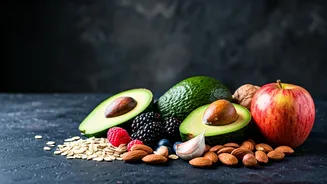Introduction to Cholesterol
High cholesterol is a significant health concern for many people, often carrying no immediate symptoms. It develops when there is an excess of cholesterol,
a waxy, fat-like substance in your blood. This excess can lead to the formation of plaque, narrowing the arteries and increasing the risk of heart disease, stroke, and other cardiovascular issues. The food you consume plays a critical role in managing cholesterol levels. The good news is that by making some strategic dietary changes, you can lower LDL (bad) cholesterol and raise HDL (good) cholesterol, thereby supporting your cardiovascular well-being. This article will explore seven foods, easily accessible and beneficial for lowering cholesterol naturally. Understanding these foods and how they work empowers you to take control of your heart health through diet.
Oats: The Fiber Powerhouse
Oats stand out for their high soluble fiber content, which helps in lowering LDL cholesterol. Soluble fiber binds with cholesterol in the digestive system, preventing its absorption into the bloodstream. Including oats in your diet can significantly impact cholesterol levels. A study revealed that consuming just 1.5 cups of cooked oatmeal daily can reduce total cholesterol by 5% to 8%. Oats can be incorporated in various ways such as starting your day with a bowl of oatmeal, adding them to smoothies, or using them in baked goods. To maximize the benefits, consider choosing whole oats or steel-cut oats, which are less processed and have more fiber. Regular consumption of oats can be a simple, yet effective strategy for heart health.
Beans: Protein-Rich Allies
Beans are a fantastic source of soluble fiber, making them an excellent choice for cholesterol management. The fiber in beans binds with cholesterol in the digestive tract, preventing its reabsorption and helping to eliminate it from the body. Beans also contain essential nutrients and are a good source of protein, helping to keep you full and satisfied, thus potentially reducing the intake of unhealthy foods. Different types of beans, such as kidney beans, black beans, and chickpeas, offer these benefits. Research indicates that incorporating beans into your diet regularly can significantly lower LDL cholesterol levels. Adding beans to your meals is simple – add them to soups, salads, or main courses. Beans are a versatile and nutritious addition to any heart-healthy diet.
Nuts: Heart-Healthy Snacks
Nuts, particularly almonds, walnuts, and cashews, are beneficial for lowering cholesterol and promoting heart health. These nuts are rich in unsaturated fats, which can help lower LDL cholesterol levels. Nuts also contain fiber, plant sterols, and other nutrients that contribute to heart health. A study suggests that consuming a handful of nuts daily can improve cholesterol levels and reduce the risk of heart disease. It's essential to eat nuts in moderation due to their high-calorie content. Choose unsalted nuts and enjoy them as a snack, add them to salads, or include them in your breakfast. Nuts provide a delicious and convenient way to support cardiovascular health while delivering essential nutrients.
Fatty Fish: Omega-3 Power
Fatty fish, such as salmon, mackerel, and tuna, are packed with omega-3 fatty acids. Omega-3s help in reducing triglycerides (another type of fat in the blood) and can increase HDL cholesterol. These are essential for overall cardiovascular health. The American Heart Association recommends eating at least two servings of fatty fish per week. Omega-3s can reduce inflammation and help to prevent the build-up of plaque in arteries. Including fatty fish in your diet is simple. It can be grilled, baked, or added to salads. Look for wild-caught fish, whenever possible, to maximize the nutritional benefits and minimize exposure to potential contaminants. Consuming fatty fish regularly is a delicious and effective approach for promoting heart health.
Avocados: Monounsaturated Magic
Avocados are rich in monounsaturated fats, which are known to lower LDL cholesterol while raising HDL cholesterol levels. These healthy fats are essential for maintaining heart health. Avocados are also a good source of fiber, vitamins, and minerals. They offer a creamy texture and mild flavor, making them versatile for various dishes. Research has shown that consuming avocados can significantly improve cholesterol profiles. You can add avocados to your salads, sandwiches, or use them as a spread instead of butter. They can also be blended into smoothies or enjoyed as a side dish. Avocados are a tasty and effective addition to your diet for heart health.
Olive Oil: Heart-Healthy Choice
Olive oil, particularly extra virgin olive oil, is rich in monounsaturated fats and antioxidants, offering various benefits for heart health. Regular consumption of olive oil can help lower LDL cholesterol levels and raise HDL cholesterol. The antioxidants in olive oil help protect against oxidative stress and inflammation, further supporting cardiovascular health. Incorporating olive oil into your diet is easy. Use it for cooking, drizzling over salads, or as a dip for bread. Make sure you choose high-quality extra virgin olive oil to maximize its nutritional benefits. Olive oil is a fundamental ingredient in the Mediterranean diet and has been linked to numerous health benefits. Using olive oil regularly is an excellent way to support heart health and improve your overall well-being.
Berries: Antioxidant Boost
Berries, such as blueberries, strawberries, and raspberries, are packed with antioxidants and fiber. These nutrients can help reduce LDL cholesterol levels and protect against heart disease. The antioxidants in berries, known as anthocyanins, help to reduce inflammation and protect the heart. Berries are low in calories and can be enjoyed in various ways. You can eat them as a snack, add them to oatmeal or yogurt, or blend them into smoothies. Research suggests that consuming berries regularly can contribute to improved heart health. Berries are a delicious and convenient way to support your cardiovascular health while enjoying a range of health benefits.











